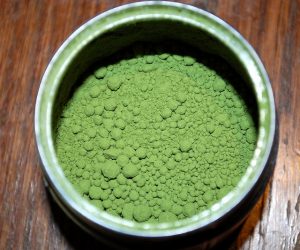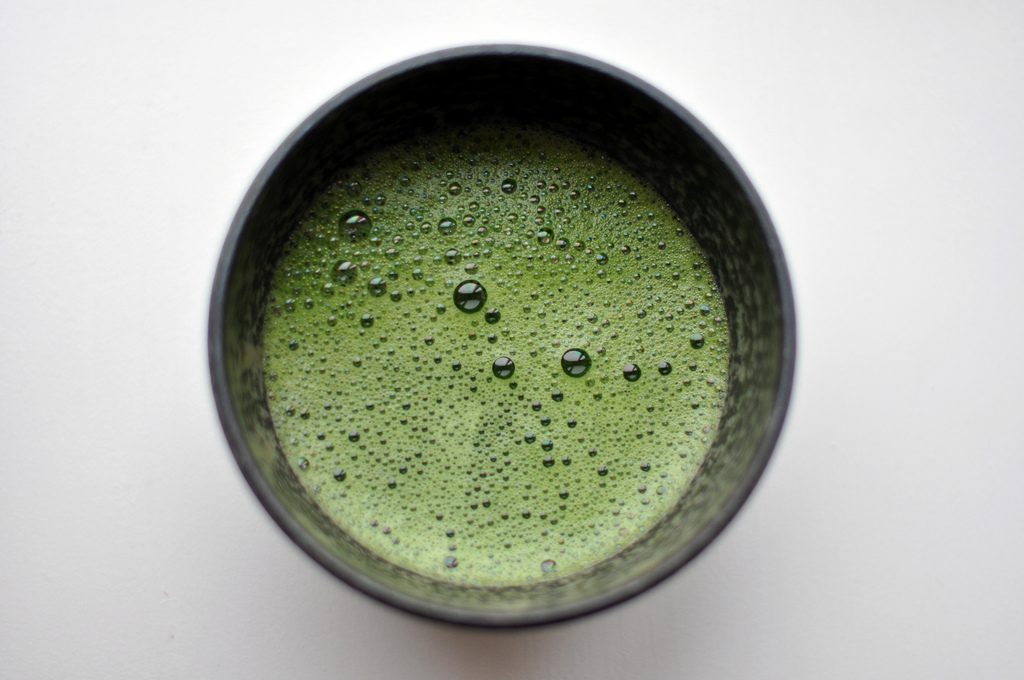Matcha is a common ingredient in greens supplements thanks to its multiple health benefits.

Matcha is a type of powdered green tea that has a higher amount of bio-active ingredients. Matcha is frequently added to green food products because it appears to:
- Boost metabolism. Green tea promotes fat loss through increased fat oxidation and other mechanisms.
- Support cardiovascular health. Green tea consumption has been linked to lowered risk of cardiovascular disorders.
- Provide neuroprotection. Green tea may protect the brain from neurodegenerative conditions such as Alzheimer’s.
- Act as a prebiotic. Green tea may promote the growth of beneficial gut bacteria.
Overview
Matcha is a variant of green tea made from tea leaves (Camellia sinensis) that are grown in shade and ground into a fine powder. Compared to standard green tea, matcha contains much higher concentrations of catechins and l-theanine – the main compounds responsible for the health benefits of tea.
In particular, matcha has an unusually high amount of the main catechin in tea called epigallocatechin gallate (EGCG) – as much as 137 times more than typical green tea.1
Considering that green tea has been shown to promote fat loss, improve brain health, support healthy gut bacteria, protect against cardiovascular disorders, and provide other benefits, it’s not surprising that matcha powder is frequently added to multi-ingredient greens supplements.

How Matcha Might Improve Your Health
Most of green tea‘s and by extent matcha’s effects are mediated by a class of polyphenols called catechins, with EGCG being the most abundant one. These compounds work via numerous mechanisms, such as:
Promoting fat oxidation
Catechins are known to inhibit catechol-o-methyl transferase (COMT), an enzyme which breaks down catecholamines – compounds such as epinephrine that play an important role in the regulation of body fat. This results in higher catecholamine levels and increased fat burning.
Catechins might also be able to influence molecules such as PGC1α that play a role in fat oxidation – the usage of fat for energy.2
Increasing thermogenesis
Catechins are believed to work in synergy with the small amounts of caffeine present in tea leaves to stimulate the sympathetic nervous system, resulting in increased thermogenesis – the body’s generation of heat. 3 This effect causes the body to burn more calories.
Reducing fat absorption
Green tea catechins also appear to reduce the digestion and absorption of fats by inhibiting certain enzymes. For example, EGCG has been shown to inhibit pancreatic lipase, an enzyme needed for fat digestion.
Antioxidant activity
Tea catechins are well known for their antioxidant activity. This effect may be particularly helpful for warding off neurodegenerative conditions such as Alzheimer’s, since oxidative stress is known to play a key role in the development of these conditions.
Matcha Uses & Potential Benefits

Given that decades of research have provided evidence for these and other benefits of standard green tea, matcha can be expected to be even more potent since it contains a significantly higher catechin content.
Research
Human Research
Clinical trials of green tea and its components have found a wide variety of health benefits.
Green tea appears to reduce body fat and risk of cardiovascular disorders
This double-blind study looked at the cardiovascular and body composition benefits of green tea extract. A total of 240 obese individuals took green tea extract with either 583 mg catechins or 96 mg catechins (control group). Compared to the control, the catechin group experienced greater loss of body weight and body fat, a drop in systolic blood pressure, and a reduction of LDL (‘bad’) cholesterol.
- The researchers concluded that “The continuous ingestion of a GTE high in catechins led to a reduction in body fat, SBP, and LDL cholesterol, suggesting that the ingestion of such an extract contributes to a decrease in obesity and cardiovascular disease risks.“4
Green tea consumption may help with diabetes
This meta-analysis paper reviewed the results of 17 studies of green tea’s effects on diabetes. The review found that green tea consumption reduced blood glucose levels, and that high-quality studies also reported a reduction of fasting insulin levels.
- The authors concluded that “green tea had favorable effects, ie, decreased fasting glucose and Hb A1c concentrations. Subgroup analyses showed a significant reduction in fasting insulin concentrations…”5
EGCG (856.8 mg) appears to promote weight loss
This randomized, double-blind study looked at the weight loss effects of a high EGCG dose green tea extract. Ninety-two obese women took placebo or green tea extract (containing EGCG 856.8 mg) daily for 12 weeks. The women given the extract lost an average of 1.1 kg – about 1.4% of their weight – and also had lower levels of cholesterol and low-density lipoprotein (LDL), which are elevated in overweight individuals.
- The researchers concluded that “this study demonstrated significant weight loss and consistent decreases in total cholesterol and LDL plasma levels after 12 weeks of high-dose EGCG treatment.“6
Green tea may ward off neurodegenerative conditions
The authors of this review paper examined the evidence and mechanisms for the neuroprotective effects of green tea catechins. In particular, they highlight that drinking green tea may be a novel strategy for warding off neurodegenerative disorders such as Parkinson’s and Alzheimer’s.
- The researchers concluded that “green tea catechin polyphenols are at present considered as multimodal acting molecules invoking a myriad of cellular neuroprotection/neurorescue mechanisms.“7
Green tea might be an effective prebiotic
This study examined the effect of green tea on gut flora. Ten people who did not normally drink green tea drank it for 10 days and had their gut bacteria composition examined before and after the experiment. The study found that the participants had a higher proportion of bifidobacterium species (many of which are used in probiotics) after consuming green tea.
- The researchers concluded that “green tea consumption might act as a prebiotic and improve the colon environment by increasing the proportion of the Bifidobacterium species.“8
Matcha Greens Dosage
- Standalone matcha is usually sold as a powder to be taken as tea, but can also come in 500 mg capsules
- Multi-ingredient greens formulas that include matcha can provide as much as 1,000 mg per serving
- The dosage used for making tea is half a teaspoon
Supplements in Review Says
- Matcha as part of a multi-ingredient greens supplement.
Matcha and even standard green tea are solid additions to greens supplements. Research confirms that green tea has a wide variety of benefits, including weight loss, lower cholesterol & glucose, reduced risk of cardiovascular disorders, neuroprotection, and more.
There is no standard dose of matcha in greens products. Most green food supplements that include matcha don’t provide the exact amount present; if you’re looking for a standard dose, standalone supplements are your best bet.
Leave a Reply